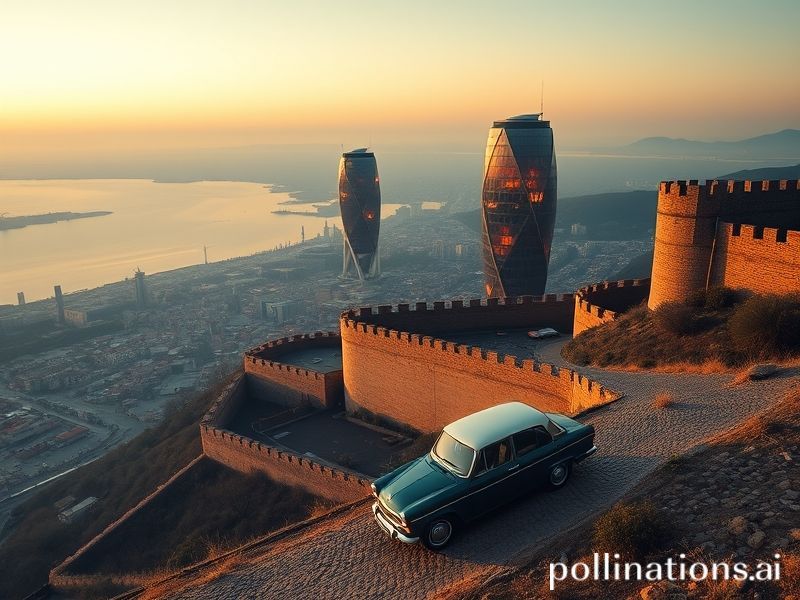Azerbaijan: Where Oil, Drones, and Eurovision Glitter Meet the New Silk Road
BAKU—Somewhere between the Caspian Sea’s oily sheen and the Caucasus’ perpetual family feud sits Azerbaijan, a country that has turned geopolitical whiplash into a national sport. For outsiders, it’s the place that keeps winning Eurovision despite democracy scores that make North Korea wince. For energy traders, it’s the pipeline that lets Europe pretend it isn’t funding three different wars every time someone in Berlin toasts a bagel. For the neighborhood, it’s the scrappy younger sibling that finally grabbed the remote control—and won’t stop flipping channels.
Let’s zoom out. While the West obsesses over whether TikTok is a Chinese psy-op, Azerbaijan has quietly mastered the art of being everybody’s second-best friend. Need gas? Baku’s got a fresh Shah Deniz cocktail, shaken not sanctioned. Need a drone demo? Their Bayraktars come with a complimentary Armenian trench line. Need a Silk Road reboot? Beijing’s already pouring concrete for the Middle Corridor, a trans-Caspian shortcut that lets freight dodge Russia and Iran—because nothing says “new world order” like routing global trade around the very countries that used to tax it.
The implications are deliciously cynical. Europe gets to virtue-signal about green energy while burning Azerbaijani fossil fuels labeled “sustainable transition.” Turkey gets a linguistic little brother who actually has cash. Israel gets a Muslim-majority ally within drone-striking distance of Tehran. Russia gets to watch its former backyard host NATO exercises without formally complaining, because, well, Ukraine is keeping the tantrum budget fully allocated. Even Silicon Valley gets a slice: data centers love the cheap Caspian breeze almost as much as they love pretending not to notice the occasional journalist who vanishes into it.
Of course, every success story needs a commemorative bloodstain. The 2020 Nagorno-Karabakh war—Azerbaijan’s 44-day military infomercial—proved that oil money plus Turkish drones equals vintage Soviet armor turning into artisanal confetti. The subsequent capture of territory wasn’t just a local real-estate shuffle; it was a global infomercial for cost-effective mechanized humiliation. Defense attachés from Nairobi to New Delhi took notes: why buy a fleet of pricey fighter jets when you can simply order a swarm that fits in a shipping container?
Meanwhile, the refugees—both Armenian and Azerbaijani—continue the world’s least fashionable marathon: running away from places the maps haven’t updated yet. Their plight keeps NGOs in business and Instagram influencers in solemn-looking photos, ensuring that sorrow remains the only truly renewable resource.
Yet Baku itself sparkles like a Vegas that read too much Nabokov. Flame-shaped towers, Formula One racetracks, and a carpet museum that doubles as a metaphor—threads knotted so tightly you can’t tell where pattern ends and propaganda begins. Tourists sip pomegranate tea while state media explains that “managed democracy” is just democracy on keto: fewer carbs, more stability. The irony is served lukewarm; locals have learned to sip carefully ever since the government figured out that jailing comedians is cheaper than writing better jokes.
What does Azerbaijan teach the planet? That if you time the music right, you can musical-chairs your way into every alliance simultaneously. That human-rights reports are simply the cost of doing business, like airport tax or forgetting your anniversary. And that geography is destiny, but destiny accepts bribes.
So toast the caviar-wielding, drone-flying, pipeline-pumping paradox while you can. In a world busy canceling itself, Azerbaijan keeps adding plus-ones to its own party. The rest of us are just taxiing on its tarmac, wondering whether we’re transiting—or already circling in holding pattern, waiting for the next price announcement.







